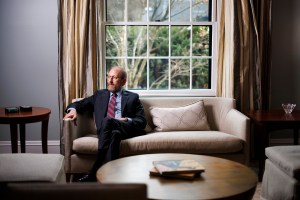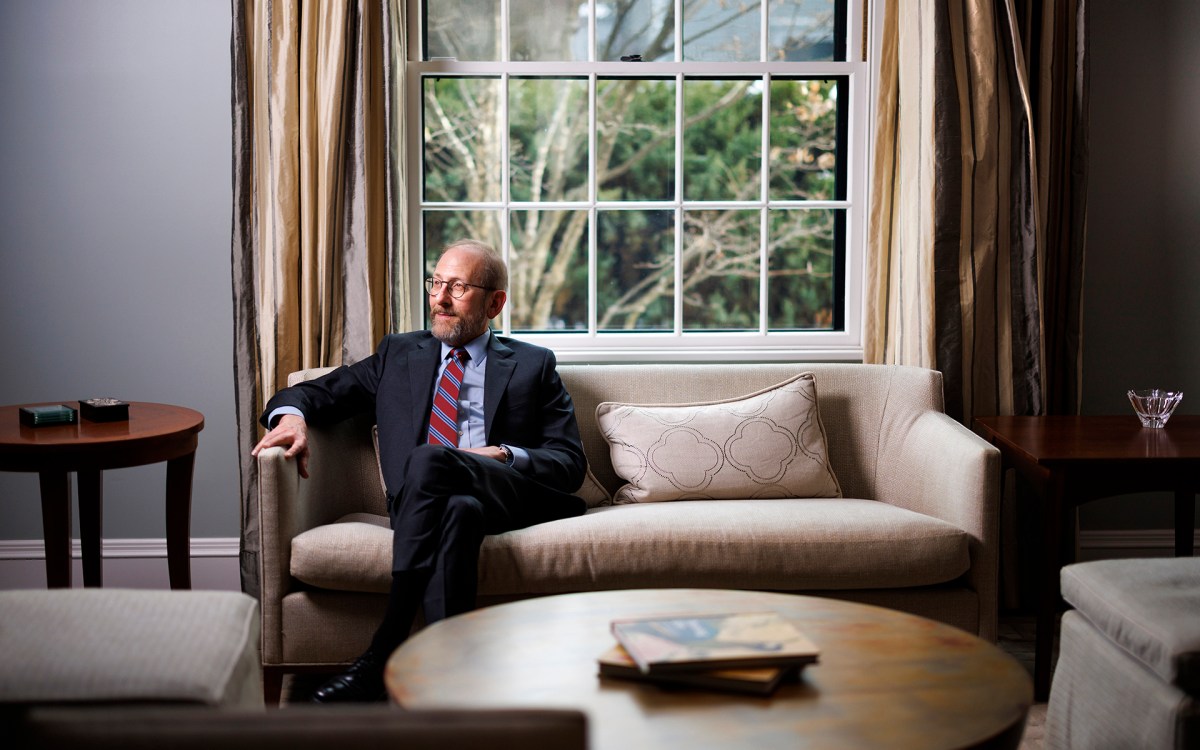Buchloh named Rosenblatt Professor of Modern Art
‘His gifts as a teacher are without peer’
Art historian Benjamin Buchloh, recognized internationally as one of today’s most important contributors to the study of post-1945 art, has been named Franklin D. and Florence Rosenblatt Professor of Modern Art in Harvard University’s Faculty of Arts and Sciences, effective Sept. 1, 2005.
Buchloh comes to Harvard’s Department of History of Art and Architecture from Barnard College and Columbia University, where he is Virginia B. Wright Professor of Twentieth-Century and Contemporary Art.
“Professor Buchloh’s command of two different and largely isolated artistic cultures – American and European modernism – is unparalleled,” says William C. Kirby, Edith and Benjamin Geisinger Professor of History and dean of the Faculty of Arts and Sciences. “With remarkable independence and rigor, he has done more than any of his contemporaries to broaden the canonical history of modern art beyond an American point of view. Additionally, his gifts as a teacher are without peer; many of the most impressive young art historians now studying postwar art are his former students.”
Buchloh’s deep knowledge of modern art and his passion as a critic have drawn young artists and students to him for more than three decades. His 1981 essay “Figures of Authority, Ciphers of Regression,” published by MIT Press in 2000 as part of an essay collection titled “Neo-Avantgarde and Culture Industry,” cemented his reputation as an art historian uniquely positioned to transform study of postwar art through his criticism, serving as both a skilled historical comparison of the art of the 1920s and 1970s and a drastic rebuttal of the neoconservative artistic trends of the latter era. Buchloh has authored six books, as well as a forthcoming monograph on Gerhard Richter, an artist whose body of work arguably ranks among the most complex produced since the 1960s and whose worldwide reputation derives in part from Buchloh’s writings over the past 20 years.
Rejecting the traditional notion of postmodernism, Buchloh’s studies of post-1945 art examine works from both their social and formal perspectives, reconciling these two traditionally disparate approaches and essentially ending a conflict that had divided art historians for several decades. His writings have continually demonstrated his belief that an artwork’s sociopolitical milieu is best understood through examination of its physical form and characteristics.
Buchloh’s attention to minute historical changes allows him to invest the recent cultural landscape with an unprecedented degree of complexity. His commanding 1989 essay on Andy Warhol continues to be regarded as the best and most comprehensive study of that artist. Buchloh’s scholarship is informed by his strong vision of the dangers facing contemporary artists in an age of commercialized culture, although his constant exploration of new theoretical models shows that his work is not grounded in a static set of ideas.
Buchloh holds an M.Phil. in German literature, awarded by the Freie Universität Berlin in 1969, and a Ph.D. in art history, awarded by the Graduate Center of the City University of New York in 1994. He has been on the faculty at Barnard and Columbia since 1994, including service as department chair from 1997 to 2000. Previously, Buchloh was an associate professor at the Massachusetts Institute of Technology from 1989 to 1994, and from 1991 to 1993 was director of critical and curatorial studies in the Whitney Independent Study Program at the Whitney Museum of American Art in New York. He has also taught at the University of Chicago, State University of New York at Old Westbury, California Institute of the Arts, Nova Scotia College of Art and Design, and Staatliche Kunstakademie Düsseldorf.




